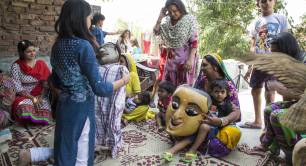Social enterprise: An idea whose time has come
How do you build trust, networks and mutual opportunity across different cultures and international borders? The British Council has been doing this across 110 countries for 80 years. Now it aims to do the same in support of the global social enterprise movement – as Global Head of Social Enterprise, Dr Mairi Mackay, explains
It has for many people been a long time coming – yet we are now witnessing a growing global conversation that reflects the speed, depth and breadth at which the social enterprise movement is coalescing across the world.
More than ever before we are creating opportunities to come together across organisations, sectors and countries and explore a collective purpose to address environmental and social issues that mainstream economic systems have continued to compound.
The recently concluded Social Enterprise World Forum in Milan is one example, bringing together social entrepreneurs and government ministers, professors and social impact investors along with development professionals and policy advisers. They came from Calabria and Cambodia, Greece and Ghana, Australia and Paraguay to tell powerful stories of transformed communities, to share smart models for measuring poverty and progress, and to debate subjects such as the need for social enterprises to achieve scale, and the propriety of making profits with purpose.
Our collective awareness of the need to understand respective market contexts whilst collaborating for greater effect by connecting ideas and opportunities from across the world is providing the momentum to ‘move the movement’ to a new level.

Dr Mairi Mackay, Global Head of Social Enterprise at the British Council
For the past eight years the British Council has been privileged to draw on the UK’s experience and expertise in social enterprise in support of the growing global social enterprise movement. Our 80 year presence in 110 countries, building trust and networks for mutual opportunity, has opened doors for us to work with the UK sector to convene those with the influence, resources, ideas and passion to create solutions that seek to bring about a different kind of economy.
Our Global Social Enterprise programme provides training, mentoring and funding opportunities to help social enterprises enhance their social impact across the 25 countries in which we are currently working. We also convene policy dialogues and conduct research studies to help leaders in countries like Bangladesh and Thailand build a supportive environment in which social enterprise can thrive. Recognising the critical role that education plays in fostering a social economy, we are rolling out a hands-on social enterprise school programme and helping universities in China, India and the UK incorporate social enterprise in their curricula and collaborate on joint research.
We are also witnessing the growing interest across the International Development sector to engage social enterprise approaches in support of that agenda. In countries such as Kenya and Ethiopia we are introducing a systemic approach to using social enterprise to access social protection, health, education and jobs, foster inclusive economic growth, and generate public-private partnerships that attract private capital to address development challenges.
Reflecting our convening and enabling role in this exciting and important space, we have brought together a range of influencers in a new film, launched this week, to set out how the social enterprise movement is spurring new thinking and action across a range of fundamental areas. About the role of business, about our approaches to social and environmental problems, about our idea of economy – and the way we define value.
Those interviewed in the film – created in partnership with another global pioneer, the international social enterprise magazine Pioneers Post – give voice to widespread concerns about our current economic models, which have not fostered fair and sustainable development and have failed adequately to address many social problems we have the capacity to solve. They explain why the social enterprise movement is gaining momentum and how the movement is creating new alliances of organisations and individuals determined to turn problems into opportunities, reduce inequalities, and build a fairer and more inclusive future.
We have an abundance of examples of progress, whether represented by individual social enterprises, promising social financing vehicles, legislative innovation, crowdfunding platforms or capacity building programmes. Yet the overall challenge remains: how we collaborate for more systemic solutions. We are, after all, in agreement that systems need to change to better serve the needs of this planet and its people.
Our film references a shift in our understanding of economy to embrace collaboration and compassion – the latter defined quite simply by the 20th Century writer and social activist Thomas Merton as, “A keen awareness of the interdependence of all things". Our individual efforts matter greatly – but not as much as ensuring collective progress. The movement needs to keep moving and will do so only if we are able to prioritise inclusive rather than individual success.
The British Council is a key partner with PwC in this year’s international social enterprise and impact investing conference in the UK, Critical Mass, taking place on 19-20 October at the Royal Institution, London. Click here for bookings and further information.
Header photo: A member of the Eats, Shoots and Roots community in Malaysia. Eats, Shoots and Roots is a social enterprise which empowers urban individuals to grow their own food



